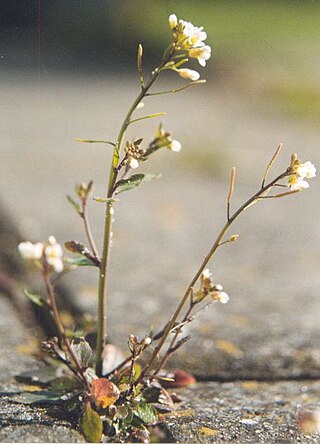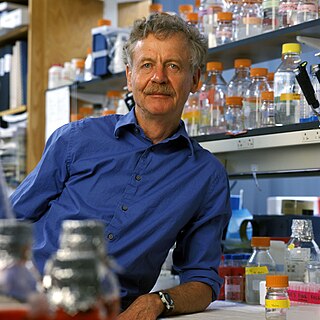
Arabidopsis thaliana, the thale cress, mouse-ear cress or arabidopsis, is a small plant from the mustard family (Brassicaceae), native to Eurasia and Africa. Commonly found along the shoulders of roads and in disturbed land, it is generally considered a weed.

Bonnie Lynn Bassler is an American molecular biologist; the Squibb Professor in Molecular Biology and chair of the Department of Molecular Biology at Princeton University; and a Howard Hughes Medical Institute Investigator. She has researched cell-to-cell chemical communication in bacteria and discovered key insights into the mechanism by which bacteria communicate, known as quorum sensing. She has contributed to the idea that disruption of chemical signaling can be used as an antimicrobial therapy.

Howard Robert Horvitz ForMemRS NAS AAA&S APS NAM is an American biologist best known for his research on the nematode worm Caenorhabditis elegans, for which he was awarded the 2002 Nobel Prize in Physiology or Medicine, together with Sydney Brenner and John E. Sulston, whose "seminal discoveries concerning the genetic regulation of organ development and programmed cell death" were "important for medical research and have shed new light on the pathogenesis of many diseases".

Rudolf Jaenisch is a Professor of Biology at MIT and a founding member of the Whitehead Institute for Biomedical Research. He is a pioneer of transgenic science, in which an animal’s genetic makeup is altered. Jaenisch has focused on creating genetically modified mice to study cancer, epigenetic reprogramming and neurological diseases.

Sir David Charles Baulcombe is a British plant scientist and geneticist. As of 2017 he is a Royal Society Research Professor. From 2007 to 2020 he was Regius Professor of Botany in the Department of Plant Sciences at the University of Cambridge.
The Gruber Prize in Genetics, established in 2001, is one of three international awards worth US$500,000 made by the Gruber Foundation, a non-profit organization based at Yale University in New Haven, Connecticut.

Cornelia Isabella "Cori" Bargmann is an American neurobiologist. She is known for her work on the genetic and neural circuit mechanisms of behavior using C. elegans, particularly the mechanisms of olfaction in the worm. She has been elected to the National Academy of Sciences and had been a Howard Hughes Medical Institute investigator at UCSF and then Rockefeller University from 1995 to 2016. She was the Head of Science at the Chan Zuckerberg Initiative from 2016 to 2022. In 2012 she was awarded the $1 million Kavli Prize, and in 2013 the $3 million Breakthrough Prize in Life Sciences.

Dame Caroline Dean is a British plant scientist working at the John Innes Centre. She is focused on understanding the molecular controls used by plants to seasonally judge when to flower. She is specifically interested in vernalisation — the acceleration of flowering in plants by exposure to periods of prolonged cold. She has also been on the Life Sciences jury for the Infosys Prize from 2018.

Detlef Weigel is a German American scientist working at the interface of developmental and evolutionary biology.
Gerald Ralph Fink is an American biologist, who was Director of the Whitehead Institute at MIT from 1990–2001. He graduated from Amherst College in 1962 and received a Ph.D. from Yale University in 1965, having elucidated the histidine pathway in budding yeast, Saccharomyces cerevisiae. After postdoctoral study at the National Institutes of Health with Bruce Ames on the regulation of the histidine operon of Salmonella, in 1967 he joined Cornell University where he became a Professor of Genetics and pursued the study of the HIS4 region of yeast. In 1982 he became a founding member of the Whitehead Institute and Professor of Genetics at MIT. Dr. Fink was elected to the United States National Academy of Sciences in 1981, to the Institute of Medicine in 1996, and to the American Philosophical Society in 2003.
Gerd Jürgens is a plant developmental biologist and emeritus Director of the Cell Biology Department at the Max Planck Institute for Developmental Biology and Head of the Center for Plant Molecular Biology (ZMBP) at the Eberhard-Karls Universität Tübingen. He has published extensively in leading journals, including eight papers in the journal Nature as well as various articles in the journals Cell, Science, Journal of Cell Biology and The Plant Journal.

Douglas Cecil Wallace is a geneticist and evolutionary biologist at the University of Pennsylvania and the Children's Hospital of Philadelphia in Pennsylvania. He pioneered the use of human mitochondrial DNA as a molecular marker.
Steve A. Kay is a British-born chronobiologist who mainly works in the United States. Dr. Kay has pioneered methods to monitor daily gene expression in real time and characterized circadian gene expression in plants, flies and mammals. In 2014, Steve Kay celebrated 25 years of successful chronobiology research at the Kaylab 25 Symposium, joined by over one hundred researchers with whom he had collaborated with or mentored. Dr. Kay, a member of the National Academy of Sciences, U.S.A., briefly served as president of The Scripps Research Institute. and is currently a professor at the University of Southern California. He also served on the Life Sciences jury for the Infosys Prize in 2011.
Jane Elizabeth Parker is a British scientist who researches the immune responses of plants at the Max Planck Institute for Plant Breeding Research.
Arabidopsis thaliana is a first class model organism and the single most important species for fundamental research in plant molecular genetics.
Christopher Roland Somerville is a Canadian-American biologist known as a pioneer of Arabidopsis thaliana research. Somerville is currently Professor Emeritus at the University of California, Berkeley and a Program Officer at the Open Philanthropy Project.
Jennifer Lyn Nemhauser is an American biologist and a Professor of Developmental Biology at the University of Washington in Seattle, Washington. She specializes in synthetic biology, genomics, and signaling dynamics in plants.
Joy Michele Bergelson is an American evolutionary biologist. She is currently the Dorothy Schiff Professor of Genomics at New York University. Bergelson was previously and James D. Watson Distinguished Service Professor of Ecology and Evolution at the University of Chicago, where she chaired the department for ecology and evolution. Her research focuses on the evolution and ecology of plants.
Jen Sheen is a biologist at Massachusetts General Hospital and Harvard Medical School who is known for her work on plant signaling networks. She is an elected member of the American Association for the Advancement of Science.
Moisés Expósito-Alonso is a Spanish scientist and assistant professor of global change biology at the University of California, Berkeley, member of the Innovative Genomics Institute, and inaugural Freeman Hrabowski Scholar from the Howard Hughes Medical Institute. His research includes the study of plants and how climate change affects their evolution.









